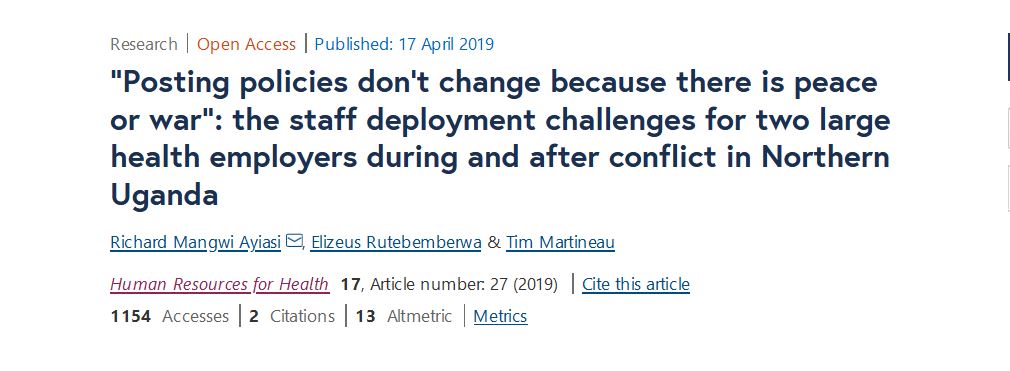
“Posting policies don’t change because there is peace or war”
The staff deployment challenges for two large health employers during and after conflict in Northern Uganda
Background
Between 1986 and 2006, the Acholi region in Uganda experienced armed conflict which disrupted the health system including human resources. Deployment of health workers during and after conflict raises many challenges for managers due to issues of security and staff shortage. We explored how deployment policies and practices were adapted during the conflict and post-conflict periods with the aim of drawing lessons for future responses to similar conflicts.
Results
There was no evidence of change in deployment policy due to conflict, but decentralisation from 1997 had a major effect for the local government employer. Lacor hospital had no formal deployment policy until 2001. Health managers in government and those working for Lacor hospital both implemented deployment policies pragmatically, especially because of the danger to staff in remote facilities. Lacor hospital introduced bonding agreements to recruit and staff their facilities. While managers in both organisations implemented the deployment policies as best as they could, some deployment-related decisions could lead to longer-term problems.
Conclusion
It may not be possible or even appropriate to change deployment policy during or after conflict. However, given sufficient autonomy, local managers can adapt deployment policies appropriately to need, but they should also be supported with the necessary human resource management skills to enable them make appropriate decisions for deployment.
Accessing the paper
You can download this Human Resources for Health paper here.
Mangwi Ayiasi R1, Rutebemberwa E1 and Martineau T2, “Posting policies don’t change because there is peace or war”: the staff deployment challenges for two large health employers during and after conflict in Northern Uganda, Human Resources for Health, 2019 17:27.
1. ReBUILD & Department of Health Policy Planning and Management, Makerere University, School of Public Health, Uganda
2. ReBUILD & Department of International Public Health, Liverpool School of Tropical Medicine, Liverpool, UK